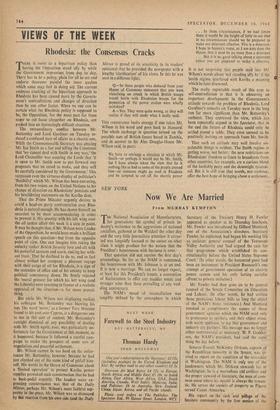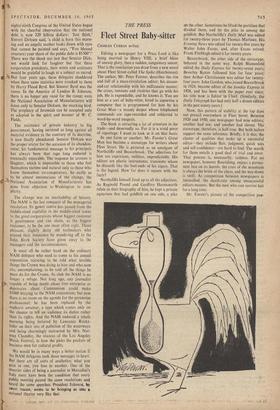NEW YORK
Now We Are Married
From MURRAY KEMPTON '
THE National Association of Manufacturers, for generations the symbol of private in- dustry's resistance to the aggressions of national socialism, gathered at the Waldorf the other day and the very little journalistic attention it attrac- ted was languidly focused at the outset on what clues it might produce for the notion that the President's honeymoon with business is over.
That question did not survive the first day's proceedings. So far as the NAM is concerned, the honeymoon with Mr. Johnson is at an end. It is now a marriage. We can no longer expect, at least for this President's tenure, a convention of businessmen to offer any madder music and stronger wine than those prevailing at any wed- ding anniversary.
The NAM's mood of reconciliation was tangibly defined by the atmosphere in which Secretary of the Treasury Henry H. Fowler appeared as speaker at its Thursday luncheon.
Mr. Fowler was introduced by Dillard Munford, one of the Association's direotors.• Secretary Fowler, he explained, had begun his working life as assistant general counsel of the Tennesq:e Valley Authority and 'had argued the case for that programme which established its con- stitutionality before the United States Supreme Court.' (In other words, the honoured guest had been an instrument in President Roosevelt's one attempt at government operation of an electric power system and his only lasting socialist affront to private initiative.) Mr. Fowler had then gone on to be general counsel of the Senate Committee on Education and Labour. (In other words, he had written those pernicious labour bills so long the object of the NAM's bitter resistance.) And Munloal invoked as compliments the names of those government agencies which the NAM used only to pronounce as epithets, and their object arose,
with warm applause, to say that government and industry are partners'. His message was no longer either controversial or necessary. W. P. Gudder- . son, the NAM's president, had said the thing the day before.
Senator Everett McKinley Dirksen, captain oi the Republican minority in the Senate, was in vited to report on the condition of the resistance in Washington. The NAM is only one of the landowners which Mr. Dirksen stewards for in
Washington; he is a marvellous old artificer and the proper steward of literature, the man of com- mon sense where his master is always the roman- tic. He serves the owners of property as Figaro served Count AlmaViva.
His report on the sack arid pillage of the business community by the first session of the
eighty-ninth Congress of the United States began with the cheerful observation that the national debt is now 320 billion dollars: 'Just think,' Everett Dirkien said, `a child is born this morn- ing and an angelic mother looks down with eyes that cannot be painted and says, "You blessed creature; your share of the public debt is $1500".' There was the shock not just that Senator Dirk- sen would look for laughter but that these corporation preSidents, their wives and assistants would be grateful to laugh at a subject so sacred.
a Not four years ago, these delegates shuddered when these same statistics were croaked to them by Harry Flood Byrd. But Senator Byrd was the raven. In the America of Lyndon B. Johnson, there is no longer any roost for the raven; even the National Association of• Manufacturers will listen only to Senator Dirksen, the mocking bird. The prophecy of Jeremiah can be accepted only as adapted in the spirit and manner of W. C. Fields.
The resistance of private industry to big government, having survived so long• against all material evidence to the contrary of its doctrine, is now finally abandoned. Senator Dirksen was the proper orator for the occasion of its abandon- ment; his fundamental message to his principals has always been that rape long endured is eventually enjoyable. The response he arouses is lthighter, which is impossible to those who feel themselves victims and natural only to those who know themselves co-conspirators. So easily as to be almost unconscious of the change, the National Association of Manufacturers has gone from objection to Washington to com- plicity.
The change was an inevitability of history. The NAM is the last conquest of the managerial revolution. Its cower centre has passed from the middle-sized capitalist in the middle-sized towns to the great corporations whose biggest customer is government and can claim, as the biggest customer, to •be the one most often right. Those pleasant, slightly dotty old toolmakers who proved their innocence by wandering off to the John Birch Society have given away to the Managers and the accommodators.
It must all be rather hard on the ordinary NAM delegate who used to come to his annual convention rejoicing to be told what terrible things the Crown was doing to him and who now sits, uncomplaining, to be told all the things he must do for the Crown. As club the NAM is no longer a refuge. Not long ago, any journalist capable of being manic about free enterprise or depressive about Communism could make $1000 braying to the NAM convention; but now there is no room on the agenda for the paranoiac professional; he has been replaced by the euphoric amateur, a type which comes only on the chance to tell an audience its duties rather than its rights. And the NAM endured a whole morning being lectured by Lawrance Rocke- feller on their sins of pollution of the waterways and being charmingly instructed by Mrs. Nor- man Chandler, the titaness of the Los Angeles Music Festival, in how she picks the pockets of business men for cultural profits.
We would be in many ways a better nation if the NAM delegates took those messages to heart. But there are all sorts of aesthetics; what you gain in one, ynu lose in another. One of the drearier sides of being a journalist in Mussolini's Italy must have been the condition that every Public meeting passed the same resolutions and heard the same speeches. President Johnson, by sweet reason, seems to be bringing us into a national theatre very like that.







































 Previous page
Previous page